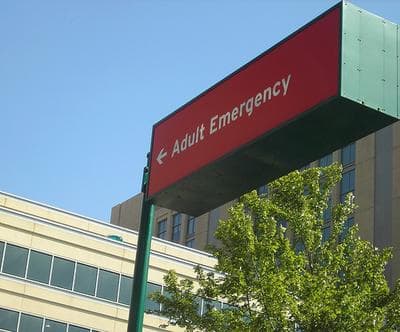Advertisement
Twenty-Four Hospitals Face Financial Penalties For Preventable Readmissions

Twenty-four hospitals across the state are facing financial penalties because their so-called "potentially preventable readmissions rates," are too high, according to MassHealth administrators.
The penalties, slated to take effect Oct. 1, are part of the new, 2012 rate contracts between the state and the 65 hospitals who care for MassHealth patients. Hospitals deemed by the state to have too many re-admitted patients will be hit with a 2.2 percent reduction in their standard payment amount per discharge, or SPAD.
Here's the list (from the state) of hospitals facing the financial penalty:
--BETH ISRAEL DEACONESS HOSPITAL — NEEDHAM
--NASHOBA VALLEY MEDICAL CENTER
--NOBLE HOSPITAL
--MILTON MEDICAL CENTER
--MARLBOROUGH HOSPITAL
--NORTH ADAMS REGIONAL HOSPITAL
--HEYWOOD HOSPITAL
--ANNA JAQUES HOSPITAL
--STURDY MEMORIAL HOSPITAL
--QUINCY MEDICAL CENTER
--MORTON HOSPITAL INC
--ST ANNES HOSPITAL
--CARITAS NORWOOD HOSPITAL
--SAINT VINCENT HOSPITAL
--ST ELIZABETH HOSPITAL
--SOUTH SHORE HOSPITAL
--CARITAS GOOD SAMARITAN MEDICAL
--METROWEST MEDICAL CENTER
--BROCKTON_HOSPITAL
--CAMBRIDGE HEALTH ALLIANCE
--SOUTHCOAST TOBEY HOSPITAL
--TUFTS NEW ENGLAND MEDICAL
--BRIGHAM & WOMEN'S HOSPITAL
--BOSTON MEDICAL CENTER
The penalty amounts were determined using a tool called the "3M Potentially Preventable Readmission" system which uses a complex calculation I will boil down this way: if your hospital is above the statewide average for potentially preventable readmissions — adjusted for severity of illness and hospital case mix — you are subject to the fine. (If you want to read the fine print, see Section 8 of the contract, "Other Quality- and Performance-Based Payments.")
Last week, the Massachusetts Hospital Association wrote a 9-page letter to Dr. Julian Harris, the state's director of Medicaid, complaining about several elements of the new contract, including the preventable readmissions penalty, which is new this year. In the letter, the MHA called the fines "inexplicable and inexcusable."
In an interview today MHA's executive vice president, Tim Gens said: "We continue to state our objections; not to the concept of having a policy addressing preventable readmissions, our issue is the approach the state is using."
Gens said the 3M PPR system is not appropriate for this use and that "this tool was rejected by [the state's] own experts." He said there are various other problems with the 3M PPr system, including that in some cases, the data used to determine which hospitals are in violation is outdated.
A spokesperson for the state health and human services department, citing a 2010 letter from the MHA, said it appears that the hospital association did support the 3M system in the past. The letter says, in part, that the MHA "approved a recommendation to support the use of the 3M PPR system for the purpose of public reporting and hospital quality improvement efforts."
Gens, of the MHA, says the group still supports the system for those purposes. "For trying to improve care delivery inside hospitals or for public reporting, it could be useful," he said. "But we do not believe it is valid" for figuring out financial penalties.
Clarification/Update: The state (and this post) initially listed "Beth Israel Hospital" as one facing the preventable readmission penalty, but I just got a copy of a letter from Jerry Berger at Beth Israel Deaconess Medical Center explaining that the state made an error in its calculation and the BI downtown should not be on the penalty list. The state later confirmed that Beth Israel Deaconess Hospital-- Needham is the facility that should be named on the penalty list, and apologized for the error.
This program aired on September 22, 2011. The audio for this program is not available.
